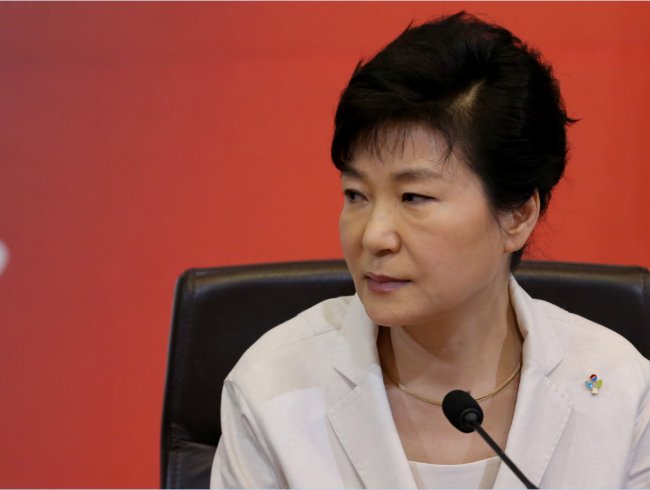President Park Geun-hye on Thursday vetoed the controversial revision to the National Assembly Act, blasting both main parties for overstepping their boundaries and neglecting their duties, in a move that highlighted widening fissures within the ruling camp and prompted the outraged opposition to threaten a boycott.
The president, in a rare strong tone, bombarded both the ruling and the main opposition parties with denunciations for passing the controversial bill that enables lawmakers to seek changes to government ordinances, while putting other contentious economy-related bills on the backburner.
The president also inveighed the politicians, including the chief whip of her own party, that they have betrayed the people in pursuit of their political interests, and that they should be sternly judged by the people in the upcoming general elections next year.
Park’s sharp criticism appeared determined with an intention to go all-out against the parties, despite the risk of facing severe confrontation with the legislature for the next three years remaining in office.
Though Park cited unconstitutionality of the bill for exercising her veto power, the decision was also seen as an attempt to overthrow the main opposition party’s attempt to weaken her leadership that has been struggling in the face of the spread of Middle East respiratory syndrome, as well as the economic fallout from its outbreak.
“The revised bill on parliamentary law violates (the government’s) judiciary rights and is an attempt to interfere in government’s administrative rights one by one … this is why the idea was rejected by previous administrations,” she said during a Cabinet meeting.
“I cannot understand the parliament’s ulterior motives for pushing ahead with a bill that has been rejected by past governments. ... It is abandoning the duty of politics that should stand for the people.”

Park exercising her veto came 10 days after the bill was sent to the Cabinet last Monday. It is her first veto of a bill since she took office in early 2013 and the 73rd presidential veto since the beginning of the Syngman Rhee administration in 1948.
Park had stood in stern opposition to the bill, saying she would use her veto power if no changes were made to the bill before it reached the stage of her endorsement.
Though the parliament sent through a toned-down version agreed on by the two main parties, the presidential office reiterated that it still violates the constitutional principle that stipulates the division of powers.
Park said that her use of veto power was “inevitable,” stressing that the bill could also paralyze the function of the executive branch and court a national crisis.
With the president returning the bill, the parliament is required to put the bill up for a vote again. The bill needs approval from more than two-thirds of attending lawmakers to override the veto. If it fails to meet the quorum, the bill will automatically be scrapped.
Shortly after Park vetoed the bill, the main opposition New Politics Alliance for Democracy threatened to boycott parliamentary sessions.
“Our party has accepted the Assembly speaker’s offer to compromise (with the ruling party to revise the wording of the act) to avoid political wrangling at a time of state emergency,” said NPAD chairman Rep. Moon Jae-in.
“Politics has vanished, only the president’s stubbornness and obstinacy remain.”
The NPAD, however, decided to separately deal with the passage of MERS-related bills. A sub-parliamentary committee on health and welfare Thursday afternoon approved a set of 19 MERS bills, sending the package to the legislation and judiciary committee for legal review before they are put to a vote.
The ruling party also appeared divided but remained cautious over Park’s biting criticism.
Saenuri chief Kim Moo-sung said that the party has decided to “respect the president’s decision.” During an emergency meeting held later in the afternoon, the governing party lawmakers agreed to abandon the bill, turning down the opposition’s demand to endorse it again.
On Park’s blistering remarks on the party leadership, Saenuri floor leader Yoo Seung-min defended himself, saying that he had done his best in leading a bipartisan negotiation with the NPAD.
Yoo and his opposition party counterpart agreed to pass the Public Servants’ Pension bill in tandem with the revised Assembly bill.
Park bombarded Yoo, holding him responsible for succumbing to the opposition party’s demand to pass the bill and casting a slur against him for being critical of her major policies.
“It is questionable what the ruling party leadership has done to support the government and the party’s efforts to revive the economy,” said Park.
By Cho Chung-un
(christory@heraldcorp.com)
-
Articles by Korea Herald




![[KH Explains] No more 'Michael' at Kakao Games](http://res.heraldm.com/phpwas/restmb_idxmake.php?idx=644&simg=/content/image/2024/04/28/20240428050183_0.jpg&u=20240428180321)






![[Grace Kao] Hybe vs. Ador: Inspiration, imitation and plagiarism](http://res.heraldm.com/phpwas/restmb_idxmake.php?idx=644&simg=/content/image/2024/04/28/20240428050220_0.jpg&u=)







